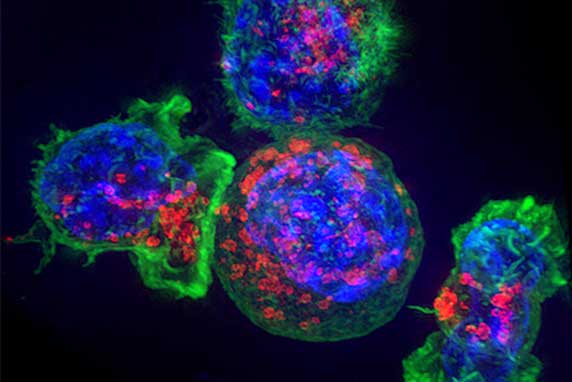Tumor cells compete with T cells for methionine, an amino acid that T cells need to maintain their histone patterns. Unfortunately, T cells consistently lose. When their histone patterns suffer, the T cells become dysfunctional, lose their fighting spirit, and let tumors grow. Could this discouraging chain of events be interrupted? Perhaps, if the right immunotherapeutic approach can be developed.
The links between methionine consumption, epigenetic patterns, and T-cell exhaustion were recently uncovered by scientists based at the University of Michigan. According to these scientists, who were led by Weiping Zou, MD, PhD, targeting cancer methionine signaling could provide an immunotherapeutic approach.
Details of the scientists’ work appeared September 2 in the journal Nature, in an article titled, “Cancer SLC43A2 alters T cell methionine metabolism and histone methylation.” The article describes how tumor cells greedily consume methionine, denying it to CD8+ T cells, which endure lower intracellular levels not only of methionine, but of the methyl donor S-adenosylmethionine (SAM).
The implications of SAM deficiency are dire. It results in reduced dimethylation at lysine 79 of histone H3 (H3K79me2) and, consequently, impaired expression of STAT5, a protein that signals T cells to sustain antitumor immunity.
As the scientists teased out these details, they considered a key question: How is it that tumor cells outcompete T cells for methionine? The answer to this question, the scientists knew, could point to new immunotherapeutic approaches.
The scientists determined that tumor cells outcompete T cells for methionine via SLC43A2, a major methionine transporter. “Given that SLC43A2 is highly expressed on multiple human and mouse tumor cells with different genetic backgrounds, abnormal tumor SLC43A2 and its related methionine metabolism are unlikely to be driven by shared key oncogenes,” the authors of the Nature article noted. “Inhibition of tumor SLC43A2 can normalize methionine metabolism in effector T cells and rescue their function, and it can also improve spontaneous and checkpoint blockade-induced antitumor immunity in preclinical models.”
Previous research had considered a systemic approach to starve tumor cells of methionine, with the idea that the tumor cells are addicted to it. But the current study shows why that approach may be a double-edged sword.
“You have competition between tumor cells and T cells for methionine,” said Zou. “The T cells also need it. If you starve the tumor cells of methionine, the T cells don’t get it either. You want to selectively delete the methionine for the tumor cells and not for the T cells.”
In fact, the study found that supplementing methionine actually restored T-cell function. High enough levels of methionine meant there was enough for both tumor cells and T cells.
“Genetic and biochemical inhibition of tumor SLC43A2 restored H3K79me2 in T cells, thereby boosting spontaneous and checkpoint-induced tumor immunity,” the scientists reported. “Moreover, methionine supplementation improved the expression of H3K79me2 and STAT5 in T cells, and this was accompanied by increased T cell immunity in tumor-bearing mice and patients with colon cancer. Clinically, tumor SLC43A2 correlated negatively with T cell histone methylation and functional gene signatures.”
Tumor cells have more of the transporters that deliver methionine. Impairing those transporters, the researchers found, resulted in healthier T cells because the T cells were able to compete for methionine.
“There are still a lot of mechanistic details we have not worked out, particularly the detailed metabolic pathways of methionine metabolism,” Zou noted. “We also need to understand how metabolism pathways may be different from tumor cells and T cells. We hope to find a target that is relatively specific to tumor cells so that we do not harm the T cells but impact the tumor.”
In the meantime, Zou is working with drug discovery experts to identify a small molecule inhibitor that targets methionine in tumor cells.


